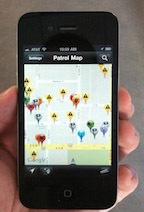jbrehm2, September 9, 2011 | View original publication
Researchers deploy crime-fighting technology
UNL researchers have developed a new community-policing tool that is generating attention around the country.
The mobile app called Proactive Police Patrol, or P3i, was developed jointly by UNL’s Department of Computer Science and Engineering, Lincoln Police Department and the University of Nebraska Public Policy Center.
Using Global Positioning System data, the program pinpoints persons of interest and crime incidents. P3i recognizes an officer’s location and sends information to a mobile device including nearby sex offenders, known gang members and active warrants. The app also can alert law enforcement officials to missing individuals.
“It allows officers to be proactive and in a very non-harassing kind of way and reminds people who are in the system that they aren’t just a face and a number,” said Ian Cottingham, director of UNL’s Computing Innovation Group and founder of Red Brain Inc., the company that will market this technology. “It theoretically decreases repeat offenders.”
A free version is available for the public on Apple or Android devices including smart phones and tablets. The public version offers access to basic, real-time information about reported incidents, including cross-streets and the type of incident that was reported. It will not include sex crimes, missing persons or any report involving a minor.
A grant from the National Institute of Justice supported the research.
Seventy-five Lincoln Police officers are already using the software on smart phones, GPS-enabled laptops and tablets.
It marks a significant change in information technology. Previously, officers were reliant on pulling information from many sources, but P3i puts this data in their hands, said Tom Casady, Lincoln’s director of public safety.
“Information is the lifeblood of policing,” he said. “Access to relevant, timely information is a key to effective policing.”
Researchers are finalizing a licensing agreement with NUtech Ventures, the nonprofit organization responsible for building partnerships between university researchers and the private sector. The agreement would allow Red Brain to take control of the license and to begin marketing the product.
“We’ve taken federally funded grant research that the university has conducted and then turned that into an actual commercial product that we hope will create jobs,” Cottingham said.
The Philadelphia Police Department already is on board with deploying the software to its 6,500 officers. Researchers also have met with departments from Minnesota, Texas and Kansas, Cottingham said.
Casady has helped put it on the radar law enforcement agencies by presenting it at conferences and referencing it in his popular blog, “The Director’s Desk.”
“We will look back upon P3i in a few years and recognize this as a time when we jumped onto a new plateau,” Casady said. “I look for location-based services like P3i to be integrated into many other criminal justice information technology products and processes in the very near future.”






